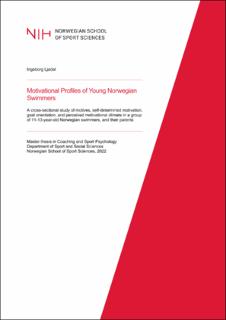Motivational Profiles of Young Norwegian Swimmers: A cross-sectional study of motives, self-determined motivation, goal orientation, and perceived motivational climate in a group of 11-13-year-old Norwegian swimmers, and their parents
Master thesis
Permanent lenke
https://hdl.handle.net/11250/3017287Utgivelsesdato
2022Metadata
Vis full innførselSamlinger
Sammendrag
Motivation is important for enjoyment, skill development, and persistence in swimming. The quality and direction of motivation is influenced by a swimmer’s perceived motivational climate, which is created by coaches and parents. The theoretical framework combines selfdetermination theory and achievement goal theory, to analyze the motivational profiles of swimmers and the influence of social climate on the profile. Parental influence has a great impact on young children’s participation motives and motivation, but previous research has so far not asked parents of their beliefs of their child’s motives and motivation. Online questionnaires were distributed to 11-13-year-old swimmers (n = 69) and their parents (n = 88). The children responded to five questionnaires measuring sport participation motives (PMQ), self-determined motivation (BRSQ), goal orientation (POSQ), coach-initiated motivational climate (PMSCQ), and parent-initiated motivational climate (MCISCQ-Parent). Parents responded to the PMQ and BRSQ indicating their belief of their child’s motives and self-determined motivation. Results showed that swimmers are predominantly intrinsically motivated, task oriented, and perceive a mastery climate from coaches and parents. Parents’ belief of their child’s motives and self-determined motivation matched the self-report of the swimmers. Coaches are shown to impact self-determined motivation and goal orientations to a greater extent than parents. In conclusion, coaches and parents should aim to maintain their current focus on mastery and enjoyment. This can ensure longer participation in and greater enjoyment of the sport, which would lead to further development and improved performance.
Beskrivelse
Masteroppgave - Norges idrettshøgskole, 2022
